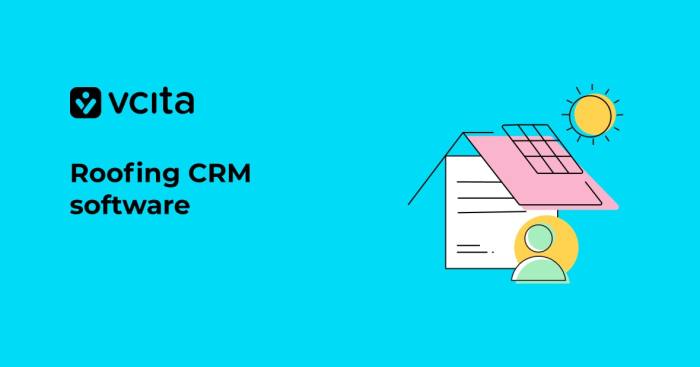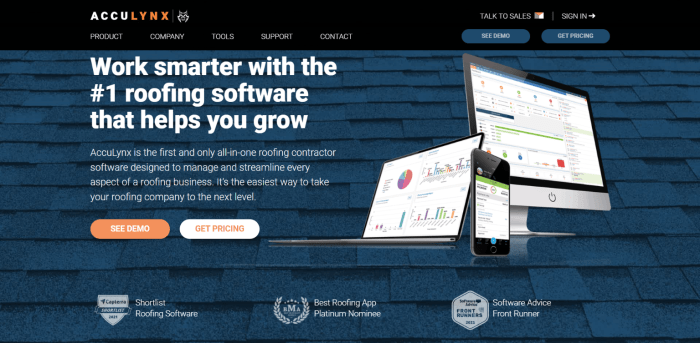Crm software for roofing contractors – In the competitive roofing industry, efficient lead management and customer relationship nurturing are paramount to success. Gone are the days of relying solely on spreadsheets and sticky notes. Today’s roofing contractors leverage the power of Customer Relationship Management (CRM) software to streamline operations, boost sales, and improve overall profitability. This comprehensive guide explores the benefits, features, and considerations for selecting the right CRM for your roofing business.
Why Roofing Contractors Need CRM Software
A dedicated CRM system offers roofing contractors numerous advantages, significantly impacting their bottom line. Let’s delve into the key benefits:
Improved Lead Management
- Centralized Database: Consolidate all customer and prospect information in one easily accessible location, eliminating the chaos of scattered spreadsheets and notes. This includes contact details, project history, communication logs, and even job site photos.
- Lead Tracking and Scoring: Effectively track leads from initial contact through the entire sales cycle. CRM systems often incorporate lead scoring features, prioritizing high-potential leads for immediate follow-up.
- Automated Follow-up: Set up automated email sequences and reminders to nurture leads and keep your business top-of-mind. This ensures consistent communication without manual effort.
- Improved Response Times: Quick access to complete customer information allows for faster and more informed responses, leading to improved customer satisfaction and increased conversion rates.
Enhanced Customer Relationship Management
- Personalized Communication: Craft targeted marketing campaigns and personalized communications based on customer preferences and past interactions.
- Improved Customer Retention: Stronger customer relationships translate into repeat business and positive word-of-mouth referrals. CRM systems facilitate this through detailed interaction tracking and personalized service.
- Streamlined Communication: Centralize all communication channels (email, phone calls, text messages) in one place, creating a seamless customer experience.
Increased Efficiency and Productivity
- Automated Tasks: Automate repetitive tasks such as scheduling appointments, sending estimates, and generating reports, freeing up valuable time for more strategic activities.
- Improved Team Collaboration: Enable seamless information sharing among team members, improving communication and coordination across the entire organization.
- Real-time Reporting and Analytics: Gain valuable insights into sales performance, customer behavior, and overall business trends, allowing for data-driven decision-making.
Better Project Management
- Job Scheduling and Tracking: Manage projects efficiently from initial quote to final completion, ensuring timely execution and minimizing delays.
- Resource Allocation: Optimize resource allocation by tracking crew availability and assigning tasks accordingly.
- Inventory Management: Some CRMs integrate with inventory management systems, allowing you to track materials and supplies effectively.
Key Features to Look for in a Roofing CRM
When selecting a CRM for your roofing business, consider these essential features:
Mobile Accessibility
Access your CRM from anywhere, anytime, using a mobile app. This is crucial for roofing contractors who are often on the go.
Integration Capabilities, Crm software for roofing contractors
Look for a CRM that integrates with other essential business tools, such as accounting software, scheduling apps, and email marketing platforms. Seamless integration minimizes data entry and improves workflow efficiency.

Source: spotio.com
Customizable Reporting and Analytics
The ability to generate custom reports and analyze key performance indicators (KPIs) is essential for tracking progress, identifying areas for improvement, and making data-driven decisions.
User-Friendly Interface
Choose a CRM with an intuitive and user-friendly interface that is easy for your team to learn and use effectively. Avoid complex systems that require extensive training.

Source: vcita.com
Customer Support
Reliable customer support is crucial, especially when dealing with technical issues or needing assistance with the software.
Top CRM Software Options for Roofing Contractors
Several CRM platforms cater specifically to the needs of roofing contractors or offer features highly beneficial to the industry. Research and compare options based on your specific requirements and budget. Examples include (but are not limited to):
- HubSpot CRM: A popular and powerful option with a free plan and scalable paid options.
- Zoho CRM: A comprehensive CRM with a wide range of features and integrations.
- Salesforce: A highly customizable and scalable platform suitable for larger roofing companies.
- JobNimbus: A CRM specifically designed for home service businesses, including roofing contractors.
- ServiceTitan: A comprehensive software solution for home service businesses, with strong project management capabilities.
Implementing Your Chosen CRM: Crm Software For Roofing Contractors
Successfully implementing a CRM involves more than just choosing the right software. Consider these steps:
- Data Migration: Carefully plan and execute the migration of existing customer data into your new CRM system.
- Team Training: Provide comprehensive training to your team on how to effectively use the CRM software.
- Process Optimization: Review and optimize your existing business processes to maximize the benefits of the CRM.
- Ongoing Monitoring and Improvement: Regularly monitor the performance of your CRM and make adjustments as needed.
Frequently Asked Questions (FAQ)
- Q: How much does CRM software cost? A: Pricing varies widely depending on the chosen platform, features, and number of users. Some offer free plans, while others charge monthly or annual subscriptions.
- Q: Is CRM software difficult to learn? A: Most modern CRM platforms are designed to be user-friendly, with intuitive interfaces and helpful resources. However, some initial training might be necessary.
- Q: How long does it take to see results from using a CRM? A: The time it takes to see a return on investment (ROI) varies, but many roofing contractors report improvements in efficiency and sales within a few months.
- Q: Can a CRM help me manage my roofing crew? A: Yes, many CRMs offer features for scheduling, task assignment, and tracking crew progress, improving overall project management.
- Q: What if my roofing business is small? Do I still need a CRM? A: Even small roofing businesses can benefit from a CRM by improving organization and communication, setting the foundation for future growth.
Conclusion
Investing in a CRM system is a strategic move for any roofing contractor seeking to enhance efficiency, improve customer relationships, and ultimately boost profitability. By carefully considering your needs and choosing the right platform, you can unlock the full potential of your roofing business and stay ahead of the competition. Remember to leverage the power of data and analytics to continuously refine your processes and optimize your performance.
Call to Action
Ready to transform your roofing business? Explore the CRM options mentioned above and choose the one that best fits your needs. Start streamlining your operations and maximizing your growth potential today!
Q&A
What are the key features to look for in roofing contractor CRM software?
Essential features include lead management, job scheduling, project tracking, communication tools (email, SMS), reporting and analytics, and ideally, integration with other business software.

Source: atticsandmore.com
How much does CRM software for roofing contractors cost?
Pricing varies greatly depending on the features, number of users, and provider. Expect a range from affordable monthly subscriptions to more substantial costs for enterprise-level solutions. Free trials or demos are often available.
Can CRM software help with estimating and invoicing?
Many CRM systems offer integration with estimating and invoicing software, streamlining the entire process from quote to payment. This integration reduces manual data entry and minimizes errors.
How long does it take to implement a CRM system?
Implementation time depends on the complexity of the system and the size of the business. Smaller businesses might be up and running within weeks, while larger companies may require more time for data migration and training.
